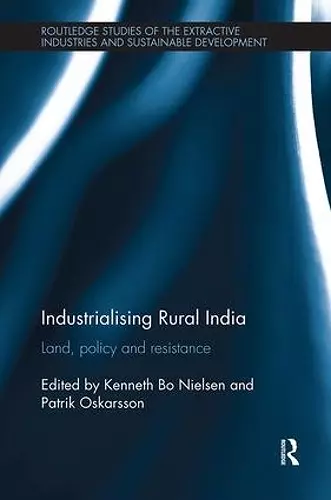Industrialising Rural India
Land, policy and resistance
Kenneth Nielsen editor Patrik Oskarsson editor
Format:Paperback
Publisher:Taylor & Francis Ltd
Published:25th Apr '18
Currently unavailable, and unfortunately no date known when it will be back
This paperback is available in another edition too:
- Hardback£150.00(9781138936713)

Rapid industrialisation is promoted by many as the most feasible way of rejuvenating the Indian economy, and as a way of generating employment on a large scale. At the same time, the transfer of land from rural communities and indigenous groups for industrial parks, mining, or Special Economic Zones has emerged as perhaps the most explosive issue in India over the past decade. Industrialising Rural India sheds light on crucial political and social dynamics that unfold today as India seeks to accelerate industrial growth. The volume examines key aspects that are implicated in current processes of industrialisation in rural India, including the evolution of industrial and related policies; the contested role of land transfers, dispossession, and the destruction of the natural resource base more generally; and the popular resistance against industrial projects, extractive industries and Special Economic Zones.
Combining the work of scholars long established in their respective fields with the refreshing approach of younger scholars, Industrialising Rural India seeks to chart new ways in the study of contemporary industrialisation and its associated challenges in India. This cutting-edge interdisciplinary work will be of interest to scholars working on industrial development and land questions in India and South Asia alongside those with an interest in sociology , political science and development research.
"This crisply edited volume addresses compelling questions concerning the transformation of India’s economy: Why does development-induced displacement generate differing levels – and types – of political resistance? To what extent have so-called "tribal" communities been able to realize new rights accorded to them? How have India’s grassroots democratic institutions, and its diverse array of social movements, responded to the challenges posed by "extractive" industries, particularly mining? Some chapters address contemporary cases and confine themselves to a single region; others are broader in scope, temporally or geographically. Though diverse in their perspectives and preoccupations, the authors share one indispensible trait: they probe ambiguities, rather than wishing them away." - Rob Jenkins, City University of New York (CUNY), USA
"The fast growing economy in India is somewhat of a paradox. The growth is in the service sector and in the building industry, not in manufacture, not in mineral production. Conscious of this, the Indian State and Corporate Capital now try to exploit every possible natural resource for their industrial production and exports.
For long the need for state land expropriation was beyond questioning. Now it is increasingly contested by people threatened by loss of land and forest. With education and political practicing of citizens’ democratic rights, and with laws to protect forest people, people now increasingly fight back with all possible means, legal, political, non-violent or even violent. India’s democracy is deepening and broadening bit by bit but not without many obstacles.
This book gives a balanced account of ground realities in many concrete case studies. It helps us to grasp the odds of a sustainable development and not just devastating destruction of human lives and of nature." - Staffan Lindberg, Lund University, Sweden
"India’s quest to industrialize has been a fraught one. This collection of essays by a new generation of scholarship ably captures the complicated plots and troubling narratives about popular resistance, dispossession, displacement, Special Economic Zones and the consequences of extractive industries. Industrialization, however, as the editors are keen to remind us, also announces new beginnings and debates for democracy, livelihoods and alternative imaginations over what constitutes meaningful development. Critiques and challenges are not without hope. This is a very significant contribution, refreshing, seminal, empirically rich and tells us, above all else, that environmental politics and the everyday worlds of the disempowered give us a full ring side view into how neo-liberal economic growth uncurls on the ground." - Rohan D’Souza, Kyoto University, Japan
"As the slogan of "Make in India" is amplified across the country, it sets in motion fresh waves of land alienation, cultural dispossession and ecological devastation. Industrialising Rural India offers a close and nuanced analysis of these processes, placing them within the nation’s long engagement with capital-intensive development and its current quest for global power. Attentive to the diversity of temporal and spatial trajectories, this important collection helps us understand the complexities of state-led capitalism and appreciate all the more the resistance it encounters on the ground. Recommended reading for everyone interested in Indian political economy and ecology." - Amita Baviskar, Institute of Economic Growth, Delhi, India
ISBN: 9781138597563
Dimensions: unknown
Weight: 390g
200 pages